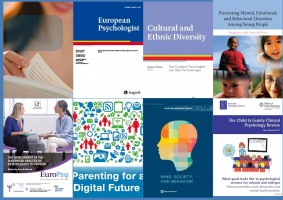_w418_h578_1.jpg)
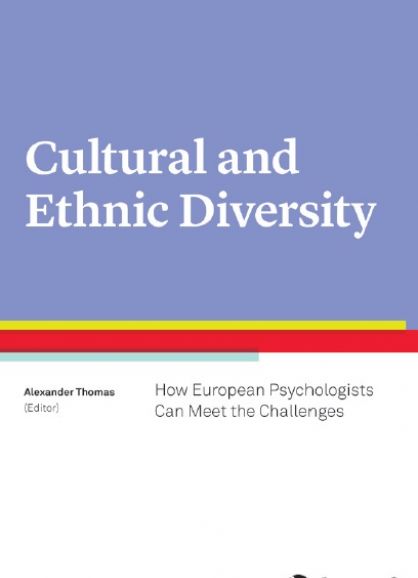
Cultural and Ethnic diversity – how psychologists can meet the challenges and grasp the opportunities
Culture and diversity are both challenge and opportunity. This volume looks at what psychologists are and can be doing to help society meet the challenges and grasp the opportunities in education, at work, and in clinical practice. The increasingly international and globalized nature of modern societies means that psychologists in particular face new challenges and have new opportunities in all areas of practice and research.
The contributions from leading European experts cover relevant intercultural issues and topics in areas as diverse as personality, education and training, work and organizational psychology, clinical and counselling psychlogy, migration and international youth exchanges.
As well as looking at the new challenges and opportunities that psychologists face in dealing with people from increasingly varied cultural backgrounds, perhaps more importantly they also explain and discuss how psychologists can deepen and acquire the intercultural competencies that are now needed in our professional lives.
Order book here: https://eu.hogrefe.com/shop/culture-and-ethnic-diversity.html

European Psychologist
Volume: 22, Number: 3 (July 2017) Special Section: Adaptation
------------------------------------------------------------------------
The issue is now available online at:
http://econtent.hogrefe.com/toc/epp/22/3?ai=sx&ui=skx&af=T
If you wish to update your preferences, please visit:
http://econtent.hogrefe.com/action/showPreferences?menuTab=Alerts
If you wish to unsubscribe from this alert, please visit
http://econtent.hogrefe.com/action/removeAlertai=k5o8&sig=gixp7rFg8og%3D
------------------------------------------------------------------------
What Do Evolutionary Models Teach Us About Sensitive Periods in
Psychological Development?
Willem E. Frankenhuis and R. Chris Fraley
European Psychologist, Vol. 22, No. 3: 141-http://econtent.hogrefe.com/doi/10.1027/10169040/a000265ai=sx&ui=skx&af=T
------------------------------------------------------------------------
Towards an Ecological Perspective on Age–Performance Relations
Rui Mata and Ralph Hertwig
European Psychologist, Vol. 22, No. 3: 151-158.
http://econtent.hogrefe.com/doi/10.1027/1016-9040/a000292?ai=sx&ui=skx&af=T
------------------------------------------------------------------------
Psychological and Cognitive Aspects of Borderline Intellectual
Functioning: A Systematic Review
Bastianina Contena and Stefano Taddei
European Psychologist, Vol. 22, No. 3: 159-166.
http://econtent.hogrefe.com/doi/10.1027/1016-9040/a000293?ai=sx&ui=skx&af=T
------------------------------------------------------------------------
Human Thriving: A Conceptual Debate and Literature Review
Daniel J. Brown, Rachel Arnold, David Fletcher, and Martyn Standage
European Psychologist, Vol. 22, No. 3: 167-179.
http://econtent.hogrefe.com/doi/10.1027/1016-9040/a000294?ai=sx&ui=skx&af=T
------------------------------------------------------------------------
Ontologies About Human Behavior: A Review of Knowledge Modeling
Systems
Angel Blanch, Roberto García, Jordi Planes, Rosa Gil, Ferran Balada,
Eduardo Blanco, and Anton Aluja
European Psychologist, Vol. 22, No. 3: 180-197.
http://econtent.hogrefe.com/doi/10.1027/1016-9040/a000295?ai=sx&ui=skx&af=T
------------------------------------------------------------------------
The Evolving Islam and Psychology Movement
Paul M. Kaplick and Rasjid Skinner
European Psychologist, Vol. 22, No. 3: 198-204.
http://econtent.hogrefe.com/doi/10.1027/1016-9040/a000297?ai=sx&ui=skx&af=T
------------------------------------------------------------------------
Meeting Calendar
European Psychologist, Vol. 22, No. 3: 205-205.
http://econtent.hogrefe.com/doi/10.1027/1016-9040/a000299?ai=sx&ui=skx&af=T

Sonia Livingstone - Parenting for a Digital Future
September is here, and with it comes the beginning of another school year. While the end of summer might mean less free time for children to ‘loaf’ in front of a screen, the demands of school life mean that children and parents will continue to confront issues surrounding digital media use, including balancing screen time and internet privacy and safety.
For over two years now, our blog has featured the newest research about children, families and digital media, with contributions from our team and researchers around the world. To kick-off the beginning of this school year, we are highlighting some recent content you may have missed.
More here:
http://blogs.lse.ac.uk/parenting4digitalfuture/2017/09/13/back-to-school/
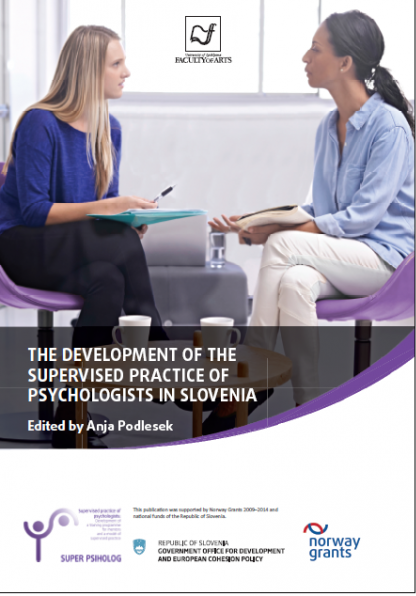
The Development of the Supervised Practice of Psychologists in Slovenia
This book is a wonderful compendium regarding the highly innovative training program for supervision in Slovenia. It is very professional, integrated and both compelling and persuasive regarding implementation of the competence model. It is comprehensive, thorough and thoughtful, providing a prototype for future implementations of similar projects.
There are a number of features that make this volume unique. It is impressionistic—powerful impressions are conveyed by individual supervisors and supervisees, providing depth and breadth to our understanding of the supervision process. The format of an edited collection also lends itself to the elucidation of multiple viewpoints and perspectives.
The book can be downloaded for free at the following link http://www.ff.uni-lj.si/sites/default/files/Dokumenti/Knjige/e-books/development.pdf
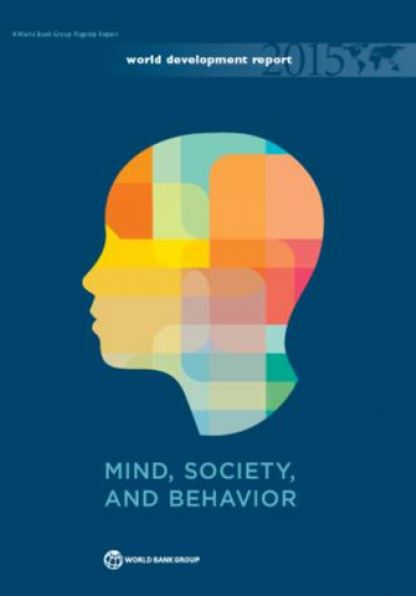
World Development Report 2015: Mind, Society and Behavior
Every policy relies on explicit or implicit assumptions about how people make choices. Those assumptions typically rest on an idealized model of how people think, rather than an understanding of how everyday thinking actually works. This year’s World Development Report argues that a more realistic account of decision-making and behavior will make development policy more effective.
The Report emphasizes what it calls 'the three marks of everyday thinking.' In everyday thinking, people use intuition much more than careful analysis. They employ concepts and tools that prior experience in their cultural world has made familiar. And social emotions and social norms motivate much of what they do. These insights together explain the extraordinary persistence of some social practices, and rapid change in others
More : https://openknowledge.worldbank.org/handle/10986/20597
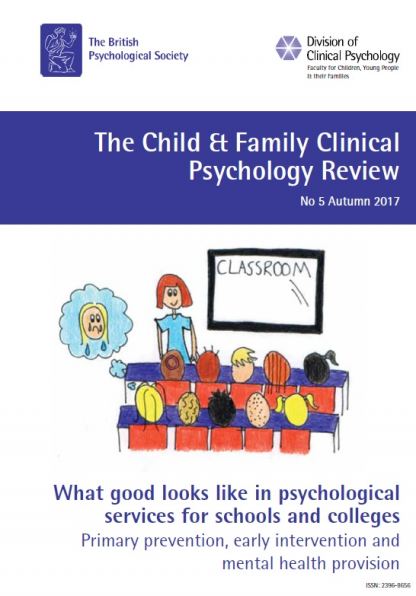
Child and Family Clinical Psychology Review No 5 Autumn 2017
The publication of the Division of Clinical Psychology Faculty for Children, Young People and Their Families. The review's mission is to promote and share good quality clinical writing and research within the field of child, adolescent and family clinical psychology by publishing annual themed editions expressing a range of views and ideas and research around a pertinent topic.
The theme of this issue is What good could look like in integrated psychological services for children, young people and their families: Preliminary guidance and examples of practice.
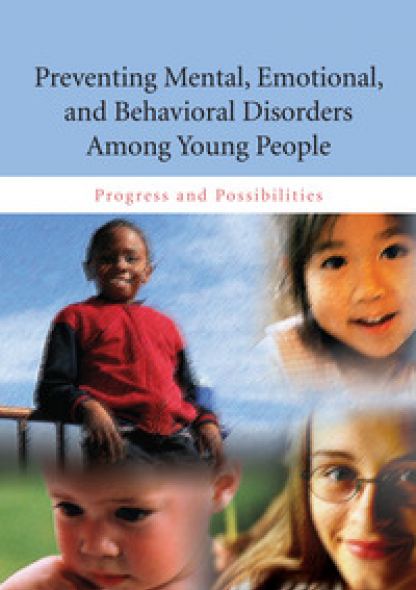
Preventing Mental, Emotional, and Behavioral Disorders Among Young People: Progress and Possibilities
Mary Ellen O'Connell, Thomas Boat, and Kenneth E. Warner, Editors; Committee on the Prevention of Mental Disorders and Substance Abuse Among Children, Youth and Young Adults: Research Advances and Promising Interventions; Board on Children, Youth and Family







